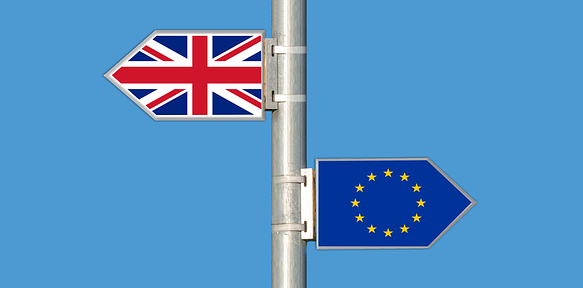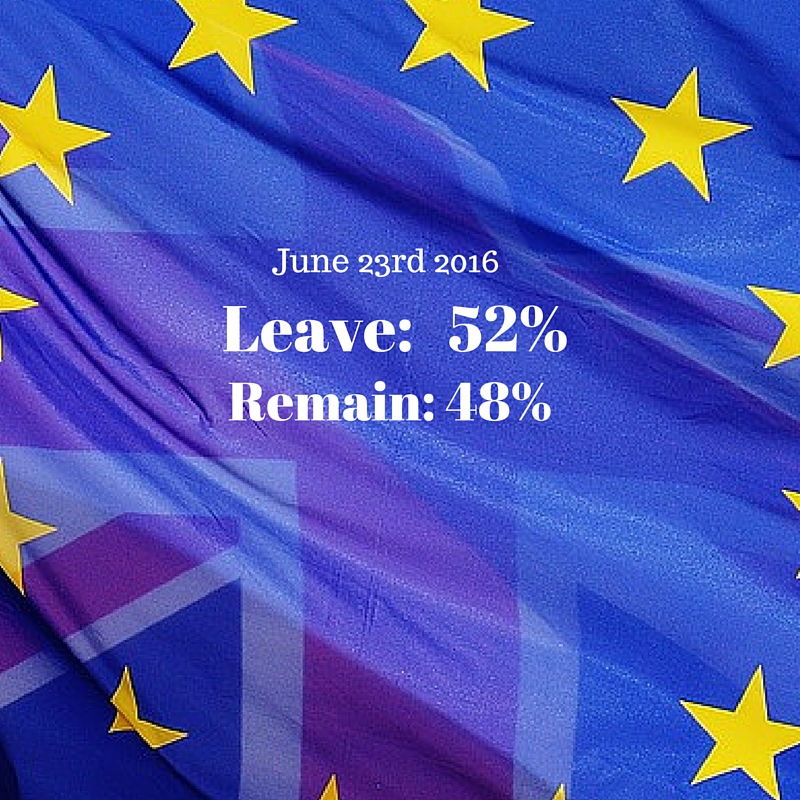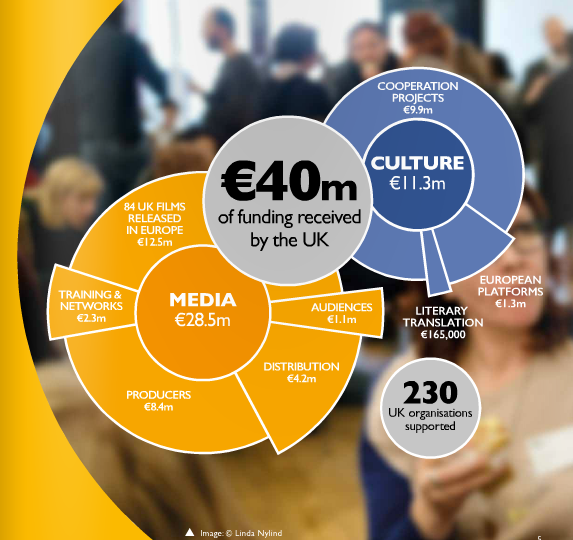
How will Brexit affect the British broadcast industry?
A few short weeks since the UK’s EU referendum and the dust has not so much settled as barely started falling.
At the time of writing, Article 50 of the Lisbon Treaty has yet to be triggered, Conservative MPs have just voted on who they think should be their next leader and the country’s next prime minister, and the three of most prominent campaigners leading up to the referendum – David Cameron, Boris Johnson and Nigel Farage – have stepped down from their respective positions.
We’ve also seen further colossal shifts within Westminster. Instability within the financial markets and recent decisions from huge corporations with bases in Britain are early signs of things to come and revealing a new reality. We are, you could argue, in unprecedented times, uncharted waters.

Where are things heading?
Within our own industry, where are things heading? How worried should we be – if at all? We take a close look at the UK broadcast industry, and the likely consequences for contractors, following the vote to leave the EU.
The backstory – what they said before the referendum:
Rebecca O’Brien, producer, Sixteen Films:
If we leave, we lose a lot of the glue that makes our business successful.
Jan Runge, CEO of Brussels-based International Union of Cinemas (UNIC):
With the three largest pan-European cinema operators based in the UK, European cinema exhibition is a British success story that benefits from common European market rules. Most US distributors operate their European head offices out of London, and British film companies benefit from EU support for film. The UK leaving the EU would be a significant backward step for British and European cinema.
Ben Richards, writer, The Tunnel:
I have read that co-productions would be a big casualty of Brexit. It’s something to do with the financing of it. It would be much harder to get the co-operation between production companies in different countries. I’m not an expert but financially it would be more complicated.
Ed Vaizey, culture minister:
Leaving the EU would be an utter disaster.
In the weeks leading up to the referendum, the British television industry was clear in its prediction that a vote to leave the EU would be detrimental to the industry and damage the UK’s position on the global content stage.
The EU currently contributes millions of pounds in subsidies to the UK market and has established a number of frameworks for co-production. Additionally, the export of British TV shows and formats to European broadcasters is worth around £376 million per year.
Not surprising, then, that in surveys conducted among TV professionals by Media Business Insight and producers’ association Pact, most respondents backed the campaign for the UK to remain in the EU.
In the days before the vote, Mike Fries, CEO of Liberty Global – which owns Virgin Media and donated hundreds of thousands of pounds to the Remain campaign – warned that the company would seriously reconsider future investment in the UK if it voted to leave the EU. “We will probably deploy capital elsewhere. We are a multinational that has plenty of opportunities to create value for shareholders and we will always seek the highest return; that’s our job,” Fries said.

The immediate aftermath
At the time of writing, EU law still stands in the UK until we cease being a member – a process that will take some time. And right now, as the pound struggles to hold a position of strength, ScreenDaily suggests that “the film and TV sectors are in limbo”.
ITV has seen almost £2.5 billion wiped off its stock market value since the vote, attracting speculation that the broadcaster could become the target of a takeover. Sky’s share price also dropped following the result.
What they said after the referendum:
Michael Ryan, chairman of the Independent Film & Television Alliance:
The decision to exit the European Union is a major blow to the UK film and TV industry. Producing films and television programs is a very expensive and very risky business and certainty about the rules affecting the business is a must.
This decision has just blown up our foundation – as of today, we no longer know how our relationships with co-producers, financiers and distributors will work, whether new taxes will be dropped on our activities in the rest of Europe or how production financing is going to be raised without any input from European funding agencies.
The UK creative sector has been a strong and vibrant contributor to the economy – this is likely to be devastating for us.”
Harvey Weinstein, Hollywood studio executive:
I think there will be discrimination now against some of the product and what it means to be European product. A lot of TV stations in Europe are under quotas. When you do War And Peace, that was accepted as European. It could be very costly in the movie and TV industry in terms of content branding. European branding is very important. It’s a big deal for these young British filmmakers.
“Neither politicians nor the media come out of this well,” added one senior broadcasting executive, who talked of “carnage” the day after the referendum.
The contractors’ outlook
If Britain’s next prime minister chooses to remain within the single market, the UK would almost certainly retain free movement rights, allowing UK citizens to work in the EU and vice versa. If, on the other hand, Britain chooses to impose working restrictions, EU member states could reciprocate, meaning British workers would need a visa to work abroad.
Following the referendum result, EU-based businesses might be more reluctant to hire specialist contractors because of the likelihood of increased administration and costs.
One of the main benefits to firms utilising contractors is that these workers can provide almost immediate expertise and generally be on site within a matter of days. This could be affected by the UK leaving the EU.
No one knows exactly how things are going to pan out, and uncertainty has rarely been a friend of business.
But, say some, this uncertainty may actually boost demand for contingent workers such as contractors, as many businesses prefer hiring them rather than permanent staff during periods of economic uncertainty.
And it could happen again, placing contractors in a relatively strong position following the vote. Chris Bryce, chief executive of the Association for Independent Professionals and the Self-Employed, said: “New circumstances always bring new opportunities for freelancers. We should be optimistic about the future.”
Employment law
Many EU employment regulations passed into UK law long ago and, as a consequence, the legislation would continue to apply at the point of Brexit. The government, civil service and legislature then face the huge task of working through EU legislation and UK law.
There are a number of pieces of UK employment legislation that are borne out of EU regulation, many of which have been part of our working lives for some time and we now take for granted. In fact, it has been argued that the UK has “gold plated” (ie, enhanced) many EU employment laws.
‘The world’s most complex divorce’ – what’s next, and will Brexit definitely happen?
The Financial Times described the UK’s vote to leave the EU as “the world’s most complex divorce”.
But, if Parliament forced a general election (two thirds of MPs would have to vote for a general election to be held before the next scheduled one in 2020), and a party campaigned – and got elected – on a promise to keep Britain in the EU, it would probably then claim that an election mandate holds more weight than the result of a referendum.
However, assuming that Brexit does indeed take place, in the context of the broadcast industry, the free movement of cast and crew between the UK and the EU which currently exists is likely to end. Also, production companies will probably have more red tape to deal with (such as work visas) and higher costs to bear (in terms of tax and accounting).
EU financial support
During its first two years (2014-2015), Creative Europe supported 230 UK creative and cultural organisations and audiovisual companies as well as the cinema distribution of 84 UK films in other European countries with grants totalling €40 million.
(Source: https://issuu.com/mediadeskuk/docs/media_creative_europe_in_the_uk_141):

EU financial support (via various funds) is likely to dry up. Productions which have benefited from such backing in the past include…
- The Last Panthers (Sky Atlantic)
- Hinterland (BBC4)
- Shaun The Sheep (BBC1)
- Inside Obama’s White House (BBC2 documentary)
- Game of Thrones (HBO)
Olswang, a London-based international law firm, details further potential ramifications concerning film distribution, copyright, the free movement of crew and other issues here.
It would be fair to say that the result of the referendum has been met by those in and around the broadcast industry with a mixture of anger and disappointment.
For more information on how the Brexit will effect the UK broadcast industry, stay tuned to In the Frame…, our monthly round-up of broadcast news. Sign up to receive our newsletter at the bottom of this page and receive an email as soon as it goes live.
For information on the latest industry opportunities, sign up here.

In The Frame - April '23

In The Frame - March '23
